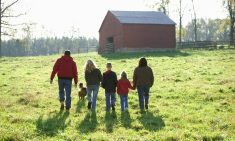When a farm or a farmer’s name comes up, you’ll sometimes hear other farmers say, “That one’s progressive.” But what does that really mean?
Of course it means they are interested in new ideas, new research and new opportunities. But that is true of all farms, so it has to be more than just that.
In this case, it turns out being “progressive” means the farm isn’t just interested in the future. It also excels at putting wheels under it.
Read Also

Sibling squeeze part 6: The emotional stakes of a family legacy
The final instalment in a six-part series exploring the challenges of sibling conflict and the effect it can have on…
Leguee Farms definitely wants to be progressive. The third-generation family team running this 14,500-acre grain farm near Fillmore, an hour southeast of Regina, has a long track record of growth, innovation and increasing opportunities.
A few years ago they realized, though, that to achieve their goals for the farm and for the family, they could do with a new level of advice and insight.
Farmers across the country will understand their thought process.
“It was something we had been thinking about for quite some time because a lot of the decisions we’re making these days are big,” says Jake Leguee. “We’re talking about multi-million-dollar decisions on equipment and land, and about how we make some of these decisions. It’s not as easy as it used to be.”
Then came the idea. “We thought, maybe having an outside perspective to look at some of these decisions with us would be beneficial,” Leguee says.
But how would you go about getting input from people who would understand the questions that the Leguees felt they needed to ask, i.e. people who would be able to provide valuable, actionable advice that would help the family make those important decisions and plot their way ahead?
Leguee admits they didn’t really know where to start. Yes, like so many farms, the family was getting further and further into corporate governance, and they were taking on multiple complex responsibilities in order to run a successful business in today’s world.
Still, none of the family knew that much about the opportunities that other businesses would use their corporate structure to tap into, or about the full range of corporate tools they might put in play. They’d heard about boards, of course, but they didn’t have a grip on the specifics. They didn’t even know who to ask.
They knew they weren’t going to get anywhere if they didn’t get started, though, so the family contacted Terry Betker of Backswath Management after learning he had helped other farms through this process.
“Terry is the facilitator of a peer group that I’ve been involved in for quite a few years now, and so I spent some time talking to him about it,” Leguee says.
Betker came up with a few possible candidates for the board and Leguee and his family already had a few people in mind that they thought might be good, so the decision was made to contact them and see who would be interested.
Beginning of the learning curve
From the outset, the process validated Leguee’s sense of what would be important.
“I wanted to find a group of people that had quite different backgrounds,” he says. “I wanted to have people who would look at our business in different ways. I didn’t necessarily want former or current farmers; I wanted people who are involved in business, and family governance, strategic planning, entrepreneurship, those types of things. We went out to try and find those types of people and got pretty lucky. We found some awesome people that have been great to work with.”

The Leguee’s farm advisory board of four people was formed and had its first virtual meeting in March 2020. That’s when the learning curve really began for Leguee and his family team that consists of Jake, his wife Stephanie, sister Sarah, brother-in-law Erik and mom and dad, Russ and Sharon.
“At our first meeting we learned a lot about what an advisory board actually needed to see,” Leguee says. “We’d never exposed ourselves to anything like this before so we had no idea what kind of information they needed, or what questions would they have, or how we should structure the meeting. After that first meeting, we realized that there were a lot more accountability pieces that we needed to get a handle on.”
To give the advisory board what they needed to work with, Leguee and the rest of the farm management team soon learned that they would need to invest some of their own time in formalizing their governance. They’d need to commit more to budgeting and long-term planning.
“It’s a lot like any sort of business governance, whether it’s a board of directors or something else. They need to see what’s the budget, what’s the strategic plan, so that they have something to hold you accountable to,” Leguee says.
“I always had cost-of-production spreadsheets, but I had never really done a budget per se, but it was something that they wanted to see, so I needed to build that. Fortunately, we had already done some strategic planning ahead of time, but some of those governance-type pieces, that you’d be used to seeing if you were ever on a board of directors, for us on the farm we had never needed them before.”
The benefits of having the advisory board are many, Leguee says. There are the multiple perspectives that the board brings, the way it challenges them to think through different scenarios, and the focus on improving communications to make the team and the farm stronger.
The farm advisory board meets electronically with the Leguee farm management team twice a year and once in-person, which this year is in the fall.
“There are people on the advisory board who have built and sold businesses, and who have gone through a lot of family drama and difficulties, and who can suggest things like, what if the family broke apart and the worst-case scenario happened?” Leguee says. “We have been told that most of the family farms that fail do so due to poor communication. As much as we plan for that not to happen, we still have to be cognizant that it’s possible, which means we have to make sure that our communication is strong so that doesn’t happen.”
Better communication extends beyond the farm and family to the other professionals and businesses the farm deals with on a regular basis, helping to strengthen the relationships it needs to be successful.
“The board has encouraged us to develop our relationship with our lenders,” Leguee says. “We have scheduled meetings with them and given them presentations on our strategic plan, and how things are going, how the year went, what next year looks like, all those sorts of things. We just didn’t do that before because I guess maybe we thought we didn’t need to but now we’re realizing there’s a lot of benefits to this.”
“Don’t be intimidated”
Importantly, the board helped the family see there was a lot they simply didn’t know.
“There are so many things that we just hadn’t heard of, and now we have a group of people that are asking those ‘what if’ questions,” Leguee says.
So, now that his family has set up their own advisory board, what advice does he have for other farmers?
“Don’t be intimated by it,” Leguee says. “It may sound onerous and kind of scary to basically give this group of people everything. They’re seeing it all — your financial statements, communication problems between you and your family members. They are there to help and make you see things differently, and if they ask you a question you don’t know the answer to, and hadn’t even thought it before, don’t feel bad about that, that’s their job, that’s what they’re there for.”
The right board for your farm
What kind of board would be right for you? And what rules should you insist on?
It’s the same in most business sectors. If you are a publicly traded company, you are required to have a board of directors. And if you’re a large company, you have a board simply because you just couldn’t be competitive without one.
By contrast, few small and medium-sized enterprises have boards. Instead, most rely on their professionals, such as an accountant and lawyers, to provide the kind of advice and insight they’d get from a board.
Partly, it may be because they don’t see enough value in board advice, but these small and mid-sized companies also have some real concerns. They worry about the time and cost it can take to establish and run a board, for instance, and they may be concerned too about the potential loss of control of the business if the board has fiduciary powers.
However, it’s important to understand that advisory boards do not have that kind of legal accountability, although they can function like a board of directors in every other way.
Advisory boards are still uncommon in farm businesses, but as farms become more complex, more and more farmers are looking to advisory boards as a resource that can help them manage and grow their businesses.
Why do you need an advisory board for your farm?
Farmers talk to their accountants, lawyers and lenders fairly often, but sometimes they might want to get a different perspective, especially if they are looking at expanding, diversifying or preparing for transition, or some other significant change to the farm business. That’s where an advisory board can come in.
“The farm owner might want to be challenged to test ideas and to gain insight from people who have demonstrated some success in their own business ventures,” says Terry Betker, president and CEO of Backswath Management. “The advisors could be anyone, but what most farmers are looking for are people in business, maybe an established farmer but it doesn’t have to be. If they’re focused on running a progressive farm, and the management challenges and opportunities that they deal with, they want to know what was it like for somebody who was in a non-farm business and had aspirations to expand? What did they learn, what did they find helpful, what did they struggle with?”
Another good reason for an advisory board is interconnectivity between people with different areas of experience and skills.
“Most farmers don’t gather their lender, accountant, lawyer and maybe their management consultant all in one meeting, so a lot of the input they’re getting is very specific to the area of expertise of the person they’re talking to,” Betker says.
“When they get an advisory board, they have all the people on the board in a meeting together and there’s accountability to that,” Betker says, but he also stresses, “The farmer needs to be prepared to come to that meeting because they will have a much different discussion, covering a lot more topics, than what they would have with just their accountant, for example.”
In fact, it may be a good idea not to have your usual professionals as part of the advisory board at all because the whole idea is to get a different view of things.
“If I was helping a farmer establish an advisory board, I would discourage them from having their accountant or lawyer there because you want the perspective of people outside of their area of professional focus, and your accountant will likely have trouble taking their accountant hat off and putting their advisory board hat on,” Betker says.
Who sits on advisory boards, and how much will they charge?
There are all kinds of people from different backgrounds and career paths who serve on advisory boards for farms. Betker knows of former CEOs and presidents and vice-presidents of very large corporations who have agreed to be part of farm advisory boards, as well as business strategists, marketing experts, retail business owners and other successful farm operators.
An advisory board is working for the benefit of the farm, and although it isn’t there to judge what the farmer does or doesn’t do, it should introduce some accountability and challenges to the farmer.
“The aim is for the farmer to get the resources or the assistance that they need and not to attract people to the advisory board that are like-minded and are basically going to rubber-stamp everything the farmers says or wants to do,” Betker says.
Why do board members do it? Not for the pay, because more often than not these advisory board members are not getting any compensation, except for maybe a small per diem to cover their expenses. Most often, they do it because they find it interesting.
“These people are entrepreneurs generally or are entrepreneurially-minded,” Betker says. “They get a chance to talk to other advisory boards or board members and to farmers that are pretty progressive. They know there are some interesting things happening on farms.”
When do you need an advisory board?
Almost always, farmers form an advisory board when there is change on the farm, whether that’s transition to the next generation, expansion, contraction or exploring new opportunities or ventures, like on-farm processing or another value-added business for example. But it’s never too early to start planning for the day when an advisory board might be beneficial.
“If I talk to farms or farmers about growth, development and longer-term strategy, my suggestion is having all the structures already in place that would create the opportunity to form an advisory board as a management resource when or if they need it,” Betker says.
“So, for a farmer to best benefit from an advisory board, they need to have a solid strategy or business plan written down that they can share with their potential advisory board, and financial information, governance discussion, and all the management pieces in place. Because if a farmer wants to attract the top-notch members to their board, these people aren’t going to want to build the plan for the farmer. They want to see the plan and support its implementation.”
Does an advisory board change?
As a business evolves, the advisory board should evolve too because its needs will change over time, and the board itself can be a part of that evolution.
“Farm businesses need to think about the composition of the advisory board now and how that might change a few years from now,” Betker says. “One board I am involved with spent time developing the whole transition of the board, when and how, who are the people they will look for, and what are the areas of focus now, and who would be the best resource. Then they looked at how that might change and impact on the makeup of the board two or three years into the future, so they are thinking of it not in terms of being static, but evolving as the business evolves.”
A lot of advisory board members also like knowing that at some point there’s going to be a turnover, so they don’t have to make a long commitment, Betker adds.
The critical importance of defining your business strategy
Business owners are not accountable to an advisory board. Advisors “advise.” Control is retained by the owner, including how to structure the board to meet the needs of the business.
Still, there are realities. “Boards will be challenged to function or will be completely ineffective if there is no formal business strategy,” Betker says. “How does a board of directors advise ownership and management if they do not know where the business intends to head or what the investment and profitability expectations are?”
Most farm businesses have some degree of a strategy, Betker says. Often, though, it isn’t written down anywhere and may get shared within the family or beyond.
Changing that can be an opportunity. It’s good for a business to articulate what it is working towards but formalizing a vision and strategy is easier said than done for many farm businesses, especially if family members are involved.
In contrast to an advisory board, a formal board is external to owners and management but it is accountable to the owners of the business, and its directors are responsible to ensure that the owners’ value is, at the minimum, preserved and at best, grown.
“To fulfill its role and responsibilities, a board of directors is required to think analytically about business performance,” Betker says. “It provides input that is constructively critical in nature. The process of simply asking questions can result in a better understanding of what ownership and management is thinking. This helps to advance the business, and helps to preserve and build owner value.”
A board of directors, together with the business owners, must ensure that the strategy is translated into operating targets.
“If financial outcomes are unsatisfactory, the board questions management to determine why,” Betker says. “Applying the adage that ‘you can’t manage what you can’t measure,’ a business has to have targets in place so that they can be used to monitor management’s performance. The hierarchy and related reporting and accountabilities are important. They reflect the organization’s structure and provide guidance as to who and what entity is responsible for what.”
Management is provided with the strategy as developed by the board and business owners and is responsible to translate the strategy and to put it into operation. But, if the strategy is flawed, management will not be able to achieve the desired performance even with a solid operational plan.
“The strategy must be well thought out and appropriate to conditions in the internal and external business environments,” Betker says. “If the strategy is flawed and operations cannot achieve the desired results, the owners or shareholder value will suffer.”
















